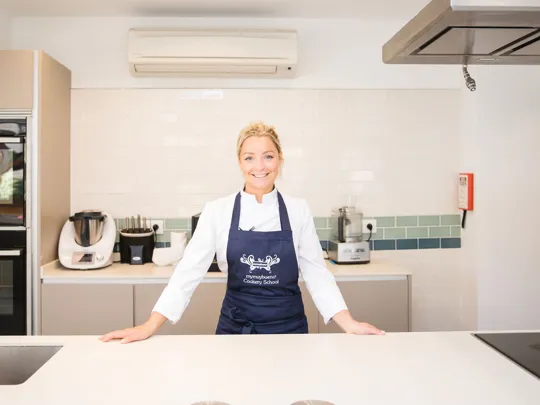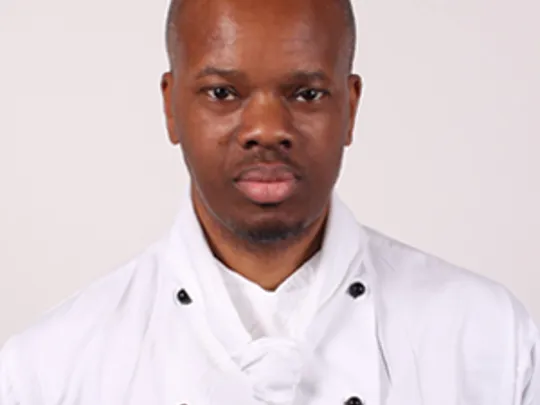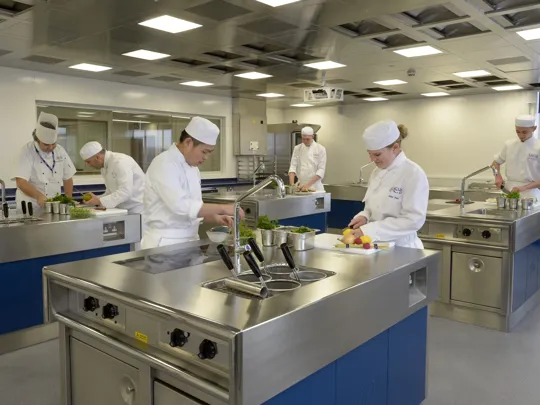of graduate employers say relevant experience is essential to getting a job with them
Why should I choose this course?
- PRACTICAL APPLICATION – Test your skills by developing new products for a variety of market sectors and working in our on-campus kitchens and restaurant
- ENRICHMENT – Gain insight from top guest speakers and opportunities for further research thanks to our wealth of food industry contacts
- EXPERT TUITION – Learn from our expert chef lecturers with vast experience of the culinary arts industry
- IN-DEPTH RESEARCH – Take on an independent research project on a subject of your choice in line with your career ambitions
- AWARD-WINNING UNIVERSITY – Study at the highest-ranking university in the region according to student choice (Whatuni Student Choice Awards 2023)
Our facilities
University College Birmingham is renowned for its outstanding food industry training facilities. Studying our Culinary Arts Management course means you will have access to our professional standard kitchens, award-winning training restaurant and state-of-the-art food development facilities.
Course breakdown
- Modules
Core Modules
Culinary Product Innovation and Creativity
Let your culinary creativity flow to design and develop new innovative food products - from the initial idea to the market launch. This module offers you the unique opportunity to gain an in-depth understanding of all the essential technical processes in commercial new product development. In this module, you will be challenged to utilise your culinary skills and knowledge to develop a wide range of innovative prototypes considering a specific product brief set by an industry partner i.e. food manufacturer as a live learning project. The additional learning focus will include healthier alternatives, considering consumer allergens and special diets e.g. vegan/vegetarian and free-from products
Research Project
You will have the opportunity to engage in an independent research project of your choice. You will have support with preparing your proposal and understanding the competent characteristics of good research. An appointed tutor will help guide you through this important and rewarding process.
Strategic Hospitality Management
You will learn the full range of strategic management issues encountered when determining the direction of the organisation. You will use analytical tools in the context of service sector-based case studies and learn procedures and techniques for a range of elements taught on this course. You will be able to identify long-term threats and opportunities for organisations in order for it to develop successfully.
Culinary Entrepreneurship Management
Have you ever imagined what it would be like to start your own culinary business? Maybe a restaurant, café, street food stall or catering business? We will prepare you for the experience by asking you to find a suitable location in the UK for your culinary business operations. In a 'Dragons' Den' session, you will pitch your idea to a 'financer' and create a business plan to support this idea going forward.
Plus one option from:
Financial Strategy
An opportunity to consolidate your financial planning knowledge, you will learn how to synthesise and evaluate business performance and strategy. You will develop an in-depth knowledge of financial concepts and how companies portray themselves through their annual reports.
Cross-cultural and Global Management in Hospitality
You will explore the ways in which a culturally diverse organisation can make use of a diverse range of perspectives offered by international team members and their varied expertise. You will focus on employees who have a global perspective in achieving success for their organisation by implementing international strategy with an awareness of cross-cultural differences.
Innovation and Creativity Management in Hospitality and Tourism
The theme for this module is the 'future environment', which gives you the opportunity to explore and analyse the innovation process in the service sector. You will understand that change is an essential component of the managerial process as you develop new products and services for use in the industry.
Personal Effectiveness and Behavioural Skills
Contemporary management thinking recognises the value of 'soft skills' and how they complement technical skills and knowledge to drive sustainable organisational performance within this ever growing global work arena. Positive workplace behaviours encompass a myriad of complex competencies, from how to effectively communicate vision and influence others, to creating constructive and positive working relationships with colleagues and stakeholders. This module will allow students to critically examine their own workplace behaviours, through the analysis of theories relating to workplace psychology, Emotional Intelligence and critical self-reflection. It will enable them to identify their personal strengths, weaknesses and areas for improvement, and allow them to consider suitable strategies to help them to develop their own personal effectiveness.
The modules listed above for this course are regularly reviewed to ensure they are up to date and informed by industry as well as the latest teaching methods. On occasion, we may need to make unexpected changes to modules – if this occurs, we will contact all offer holders as soon as possible.
Entry requirements
Entry requirements
Academic: A relevant HND or a foundation degree in the areas of Culinary Skills, Culinary Arts or Culinary Management, with 240 credits.
If you are unsure if your previous qualification is suitable, please contact us before completing an application. You can complete our enquiry form here or call us on 0121 604 1040
International students
Academic: European and International qualifications studied in a relevant subject matter will also be considered. Applicants will need to have achieved 120 ECTS or equivalent (European Credit Transfer).
If you are unsure if your previous qualification is suitable, please contact us before completing an application. You can call us on 0121 604 1040 or complete our enquiry form:
Key information
Teaching and assessment
Note: Indicative information only – actual timetables and assessment regimes will be issued at your induction.
Teaching
Example of a typical teaching week (up to 19 contact hours):
- Large group teaching – 4 hours
- Smaller group teaching – 2 hours
- Practical kitchen session – 10 hours
- Tutorials – 1-2 hours
- Subject advice sessions – 2 hours
You will also need to commit around 20 hours per week for individual study time.
Assessment
Estimated breakdown of assessment for this course:
- Coursework – 52%
- Practical assessment – 32%
- Written examinations – 16%
Our teaching and assessment is underpinned by our Teaching, Learning and Assessment Strategy 2021-2024.
Uniform and kit costs
This course requires a uniform and kit costing approximately £230, depending on the items you purchase. (Prices are subject to change each year – exact costs and information on how to order required items will be provided to you prior to enrolment.)
Tuition fees for international students
If you are an international student (or have been fee assessed as an international fee payer) and are enrolling on a full-time bachelor's degree course in 2024/2025, the fee for the academic year will be £14,000. If you complete a placement year, there will be an administration fee of £500 for a full year or £250 for a half-year placement.
In 2025/26, the tuition fee for [Band 3] courses will be £19,750 per year.
Kick-Start Scheme
As a new student studying this course full-time, you will receive £300 per year through our Kick-Start Scheme (UK students only, eligibility criteria applies). This scheme will support your studies and future career by contributing to course-related materials, uniform or selected items on campus. You may also qualify for an additional £500 per year.
Find out more about the Kick-Start Scheme here.
Unibuddy Community - meet other students on your course
Starting university is an exciting time, but we understand that it can sometimes feel a little daunting. To support you, you will be invited to join our Unibuddy Community, where you can meet other students who have applied for the same course at University College Birmingham, before you start studying here.
As soon as you have been made an offer, you will be sent an invitation email to complete your registration and join the Unibuddy Community. For more information, check out our Unibuddy Community page.
Latest updates
Join the conversation and check out the latest updates from Birmingham College of Food.
| UCB Food Courses | |
| Restaurant at Birmingham College of Food |
Accreditations, endorsements and partnerships
University College Birmingham works with a wide range of organisations to ensure you receive the best possible training and qualifications recognised by industry.
Work experience
Work experience is vital for learning how to apply your training in the real world and for building your confidence and skills before you finish your course – and it may even lead to a job when you graduate. Our Hired team can help you find suitable work experience.
We encourage students on our BA Culinary Arts Management top-up course to gain work experience throughout your studies.
Work alongside experts in your sector
A snapshot of some of the employers we have worked with:
- White Barn Inn and Spa (Maine, USA)
- The Savoy (London)
- Gleneagles (Scotland)
- Celtic Manor (Wales)
- The Landmark (London)
- Ashford Castle (County Mayo, Ireland)

I always recommend this course to anyone with a passion for food or hospitality as it gives you such a wide range of tools and skills. I completed a year’s placement in New Hampshire, USA, during my degree course and am now senior tutor at the Raymond Blanc Cookery School.
Our graduate stories
From Michelin-starred Brad Carter to MasterChef finalist Leo Kattou, our students and alumni from the College of Food and Hospitality Management are doing incredible things. Hear some of their fascinating stories below:
Career opportunities
The example roles and salaries below are intended as a guide only.
Head chef
Average salary: £35,000 - £50,000
Sous chef
Average salary: £30,000 - £40,000
Food business owner/restaurateur
Variable
Catering manager
Average salary: £22,000 - £45,000
Culinary arts lecturer
Average Salary: £39,239
Restaurant manager (casual dining – Michelin)
£25,000 - £42,000
Want to take your studies to the next level? Completing the BA (Hons) degree will enable you to move onto our postgraduate courses such as Culinary Arts Management MA/PGDip.

Claire’s Story
As one of the youngest finalists on MasterChef: The Professionals, Claire honed and sharpened her skills at University College Birmingham.
Meet your lecturers
















